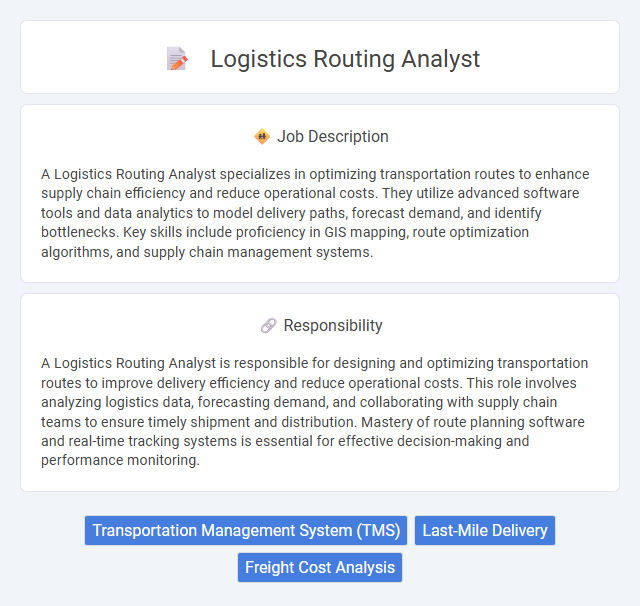
A Logistics Routing Analyst specializes in optimizing transportation routes to enhance supply chain efficiency and reduce operational costs. They utilize advanced software tools and data analytics to model delivery paths, forecast demand, and identify bottlenecks. Key skills include proficiency in GIS mapping, route optimization algorithms, and supply chain management systems.
People with strong analytical skills and a knack for problem-solving are likely suitable for a logistics routing analyst job, as the role involves optimizing delivery paths and managing complex data sets. Those who enjoy working with algorithms and have attention to detail may find the position engaging and fulfilling. Conversely, individuals who tend to avoid repetitive tasks or struggle with data interpretation might find challenges in meeting the role's demands.
Qualification
Logistics routing analysts require strong analytical skills and proficiency in routing software such as GIS, ArcGIS, or route optimization tools, combined with knowledge of supply chain management and transportation logistics. A bachelor's degree in logistics, supply chain management, operations research, or related fields is typically essential, alongside experience interpreting spatial data and optimizing delivery routes. Expertise in data analysis software like Excel, SQL, and Python enhances problem-solving efficiency and decision-making accuracy in dynamic routing environments.
Responsibility
A Logistics Routing Analyst is responsible for designing and optimizing transportation routes to improve delivery efficiency and reduce operational costs. This role involves analyzing logistics data, forecasting demand, and collaborating with supply chain teams to ensure timely shipment and distribution. Mastery of route planning software and real-time tracking systems is essential for effective decision-making and performance monitoring.
Benefit
Logistics routing analysts likely improve supply chain efficiency by optimizing delivery routes, reducing transportation costs, and minimizing fuel consumption. Their work probably enhances customer satisfaction through timely and accurate shipments, increasing overall operational productivity. Companies may experience a significant return on investment due to better resource allocation and streamlined logistics processes.
Challenge
A Logistics Routing Analyst likely faces challenges in optimizing delivery routes to balance cost efficiency with timely service, requiring advanced analytical skills and real-time problem-solving abilities. They may frequently encounter unpredictable variables such as traffic patterns, weather conditions, and shipment delays, which complicate the routing process. This role probably demands continuous adaptation to evolving data and technology to maintain effective supply chain operations.
Career Advancement
Logistics routing analysts leverage data analytics and optimization software to improve supply chain efficiency, positioning themselves for advancement into senior operations management roles. Mastery of route optimization algorithms and proficiency in tools like GIS and TMS enhances their strategic value within logistics companies. Continuous skill development in predictive analytics and machine learning paves the way for leadership positions such as logistics manager or supply chain strategist.
Key Terms
Transportation Management System (TMS)
Logistics routing analysts leverage Transportation Management Systems (TMS) to optimize routing strategies, reduce transportation costs, and improve delivery efficiency. Utilizing advanced analytics and real-time data integration within TMS platforms, they develop and adjust routes based on variables such as traffic patterns, load capacity, and service windows. Proficiency in TMS software enhances decision-making capabilities, enabling seamless coordination between carriers, warehouses, and distribution centers to streamline supply chain operations.
Last-Mile Delivery
A Logistics Routing Analyst specializing in Last-Mile Delivery optimizes delivery routes to enhance efficiency, reduce costs, and improve customer satisfaction. They utilize advanced algorithms, GPS data, and real-time traffic insights to create dynamic routing plans that minimize delivery times and fuel consumption. This role requires expertise in transportation management systems, data analysis, and an understanding of urban logistics challenges.
Freight Cost Analysis
A Logistics Routing Analyst specializing in Freight Cost Analysis evaluates transportation expenses to identify cost-saving opportunities and optimize shipping routes. Utilizing data analytics and freight rate benchmarking, they ensure efficient carrier selection and contract negotiation. Proficiency in transportation management systems (TMS) and understanding of freight cost components such as fuel surcharges, accessorial fees, and tariff structures are essential for maximizing logistics efficiency.
 kuljobs.com
kuljobs.com